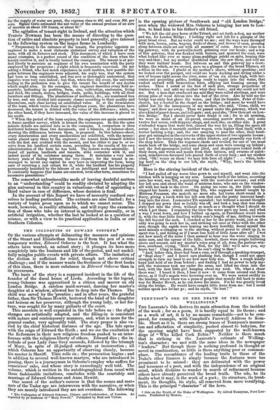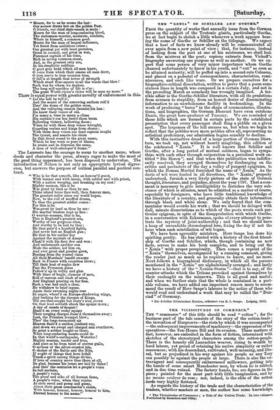TENNYSON'S ODE ON THE DEATH OF THE DIIXE OF WELLINGTON.'
Tan Laureate's Ode derives its main attraction from the incident of the week for as a poem, it is hardly equal to its theme; and as a work Of art, it is by no means remarkable—not to be com- pared, for example, with Campbell's Farewell Address to Kern- ble. Short as it is, there are strong traces of Tennyson's manner- ism and affectation of simplicity, pushed almost to baby_ism for the opening might have been suggested by the well-known dirge of "Who killed Cook Robin ?" Neither is there much that is striking in the Laureate's estimate of Welling- ton's character; we met with the same ideas in the newspaper "leaders." But though there is nothing profound in thought or novel in combination as little is there anything poor or common- place. The resemblance of the leading traits to those of the Duke's other limners is simply because the features were too prominent to be. missed: they are delineated with the power and terseness of a poet, and with the independence of an original mind, which disdains to wander in search of refinement because others have already perceived the broad truth. The ode, be its i
faults what it may, s the work of a poet ; its structure, its treat- ment, its thoughts, its style all removed from mere -versifying. This is the principal " character " of the hero.
• Ode on the Death of the Duke of Wellington. By Alfred Tennyson, Poet Lau- reate. Published by Idozon.
"Mourn, for to us he seems the last : Our sorrow draws but on the golden Past.
0 friends, our chief state-oracle is unite: Mourn for the man of long-enduring blood, The statesman-warrior, moderate, resolute, Whole in himself, a common good. Mourn for the man of largest influence, Yet freest from ambitious crime •
Our greatest yet with least pretece,
Great in council, and great in war, Foremost captain of his time, Itch in saving common-sense, And, as the greatest only are,
In his simplicity. sublime.
0 geed grey head which all men knew, 0 voice from which their omens all man drew, 0 iron nerve to true occasion true, 0 fall'n at length that tower of strength Which stood four-square to all the winds that blew Such was he whom we deplore. The long self-sacrifice of life is o'er ; The great World-victor's victor will be seen no more."
There is equal power with greaternovelty of enforcement in this.
" Let the WI be toll'd ; And the sound of the sorrowing anthem roll!d Thro' the dome of the golden cross, And the volleying cannon thunder.his
He knew their voices of old.
For many a time in many a.elime His captain's-ear has heard them broom Bellowing victory, bellowing doom; When he with those deep voices wrought, Guarding realms and kings from shame ; With those deep voices our dead captain taught The tyrant, and asserts his claim In that dread Bound to the great name, Which he has worn so pure of blame, In praise and in dispraise the same, A man of well-attemper'd frame."
The Laureate has the courage to recur to another name, whose deeds and character the press, always eager to make the most of
the good thing uppermost, has been. disposed to undervalue. The Introduction of Nelson is not only an appropriate lyrical digres- sion, but answers the purpose of critical. parallel and poetical con- trast.
"Who is he that cometh, like an honour'd guest,
With banner and with music, with soldier and with priest,
• With a nation weeping, and breaking on my rest ? Mighty seaman this is he
Was great by land as thou by sea.
Thine island loves thee well, thou famous man, The greatest sailor since our world began. • Now, to the roll of muffled drums, To thee the greatest soldier comes : For this is he
Was great by land as thou by sea : His martial wisdom kept us free 0 warrior-seaman, this Is he, This is England's greatest son, Worthy of our gorgeous rites, And worthy to be laid by thee; He that gamed a hundred fights, And never lost an English gun ; He that in his earlier day Against the myriads of Assaye (llai'd with his fiery few and won : And underneath another sun Made the soldier, led him on, And ever great and greater grew, Beatin4- from the wasted vines All then Marshals bandit swarms Back to France with countless blows ; Till their host of eagles flew Past the Pyrenean pines Pollow'd up in valley and glen With blare of bugle, clamour of men, Roll of cannon and clash of arms, And England pouring on her foes. Such a war had such a close.
• He withdrew to brief repose. Again their ravening eagles rose In anger, wheerd on Europe-shadowing wings,
And barking for the thrones of Sings,
Till one that sought but Duty's iron crown On that loud sabbath shook the spoiler down ; A day of onsets of despair! Dash'd on every rocky square
Their surging charges foam'd themselves away; Last, the ian trumpet blew;
Thro' the long-tormented air Heaven ti.ash'd a sudden jubilant ray, And down we swept and charged and overthrew. So great a soldier taught us there, What long-enduring hearts could do In that world's-earthquake, Waterloo !
Mighty seaman' tender and true,
And pure as he from taint of craven guile, 0 saviour of the silver-coasted isle, 0 shaker of the Dottie and the Nile, If aught of things that here befall
Touch a spirit among things divine,
If love of country move thee there at all, Be glad, because his bones are laid by thine ! And thro' the centuries let a people's voice In full acclaim, A people's voice, The proof and echo of all human fame, A people's voice, when they rejoice At civic revel and pomp and game, Attest their great commander's claim,
With honour, honour, honour, honour to him,
Eternal honour to his name."



























 Previous page
Previous page